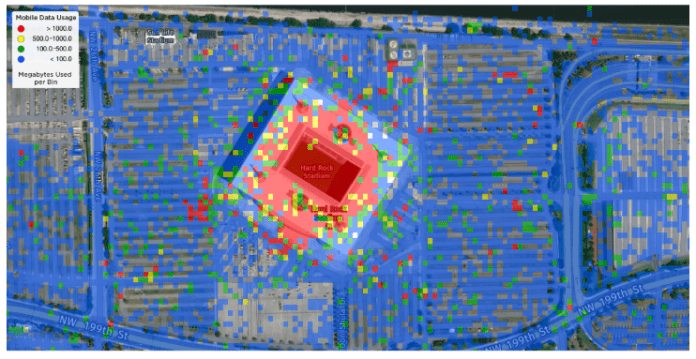The Kansas City Chiefs may have won the Super Bowl, but which carrier was the winner in terms of network experience during last weekend’s game?
According to analysis from Ookla Speedtest, if you’re talking download speeds, Verizon dominated. If you mean upload speeds, T-Mobile US delivered. And the picture generally holds true for both of those carriers’ LTE and 5G networks.
“This is no ordinary sporting event, and operators have been working for many months on their playbooks for providing the best possible performance at Hard Rock Stadium,” Ookla said in a blog post on its data from the event. (For an overview of carriers’ investments in Miami ahead of the big game, read this.)
Ookla looked at data from the stadium during the period of two hours before kick-off, to 30 minutes after the game ended.
In terms of overall cellular performance, Verizon delivered a whopping 297 Mbps mean download speed across its available networks, more than 140% faster than second-place finisher T-Mobile US at about 122 Mbps across all network technologies. Sprint came in third at about 115 Mbps and AT&T was fourth with a mean download speed of about 104 Mbps.
T-Mobile US had the fastest mean cellular network upload speed as well as the lowest network latency, according to Ookla’s numbers.
On 5G specifically, Verizon’s mean download speed was at nearly 650 Mbps, although the upload speed was less than 10 Mbps. T-Mobile US’ 5G network offered download speeds of about 350 Mbps (and the best performance in upload speeds at nearly 29 Mbps), and Sprint 5G came in at about 225 Mbps. AT&T did have some 5G speedtests, Ookla noted, but fewer than the 10 which was its threshold for the data analysis.
The stadium Wi-Fi network showed signs of strain, but still delivered faster upload speeds than the cellular networks at about 46 Mbps. Ookla noted that the mean download speeds during the Super Bowl were about 25% slower than during a different game at Hard Rock Stadium in late December, which Ookla used as a baseline.
For more of Ookla’s analysis of Super Bowl network performance in the stadium and around Miami, check out its blog post on the data.

